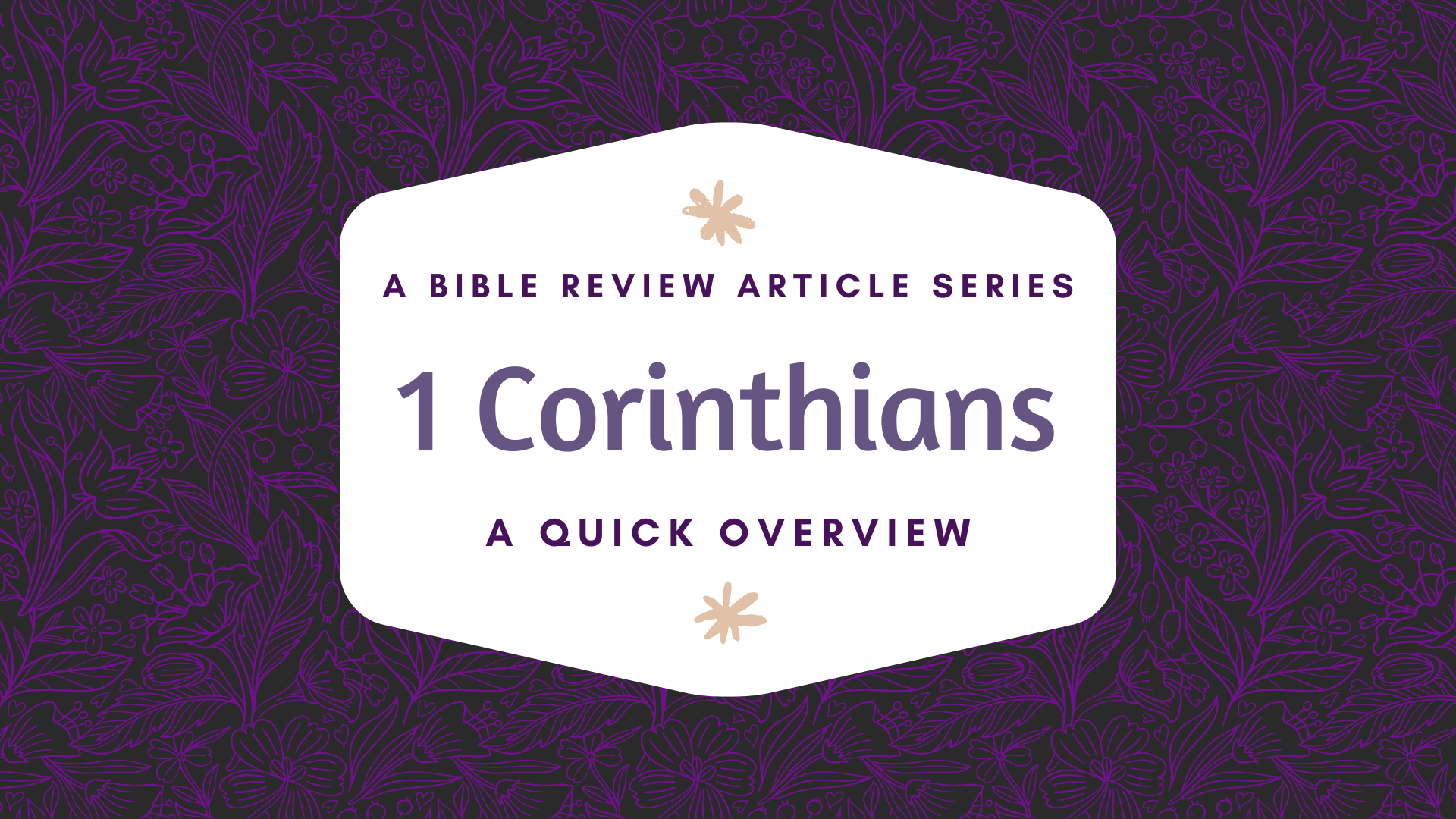
1 Corinthians:
A Quick Overview
by Milo





Follow us on social media for
FREEBIES and New Article releases.
OR
Sign Up for Our Freebie Email List and Have Freebies Delivered Directly To Your Inbox
Introduction
1 Corinthians is a letter written by the Apostle Paul to the church in Corinth. It addresses issues of division, immorality, and confusion regarding spiritual gifts and worship. Paul encourages believers to live in unity, purity, and love.
Authorship and Date
Written by the Apostle Paul around AD 55, likely during his stay in Ephesus during his third missionary journey.
Purpose and Themes
Paul wrote this letter to correct behavior, settle doctrinal confusion, and call the Corinthians to unity and holiness. Major themes include:
- Unity in the Church: Avoiding divisions and factions.
- Christian Conduct: Living a life that honors God in speech, behavior, and relationships.
- Spiritual Gifts: Understanding and properly using the gifts of the Spirit.
- Love: The greatest virtue in Christian life (1 Corinthians 13).
- Resurrection: Assurance and hope of bodily resurrection (chapter 15).
Key Verses
- 1 Corinthians 1:10 – "I appeal to you, brothers and sisters, in the name of our Lord Jesus Christ..."
- 1 Corinthians 6:19–20 – "Do you not know that your bodies are temples of the Holy Spirit...?"
- 1 Corinthians 10:13 – "No temptation has overtaken you except what is common to mankind..."
- 1 Corinthians 13:4–7 – "Love is patient, love is kind..."
- 1 Corinthians 15:3–4 – "Christ died for our sins... he was buried, and... raised on the third day..."
Summary of Content
Paul addresses a variety of problems plaguing the Corinthian church. He deals with issues of division, immorality, lawsuits among believers, confusion over marriage, idolatry, gender roles, the Lord’s Supper, spiritual gifts, and the resurrection. He calls them to maturity in Christ, unity, and a deep love for one another.
Structure of 1 Corinthians
- Chapters 1–4: Unity and the wisdom of God
- Chapters 5–7: Moral and relational issues
- Chapters 8–10: Christian liberty and responsibility
- Chapters 11–14: Worship and spiritual gifts
- Chapter 15: Resurrection of the dead
- Chapter 16: Final instructions and greetings
Notable Characters
- Paul: Author and apostle to the Gentiles
- Apollos: A respected teacher in the Corinthian church
- Chloe’s household: Reported divisions in the church to Paul
- Timothy: Paul’s fellow worker, mentioned in the letter
- Cephas (Peter): A leader whom some Corinthians claimed allegiance to
Application and Relevance
1 Corinthians remains highly relevant today as it teaches how Christians should live together in love and harmony, handle disputes, honor God with their bodies, and maintain order in worship. The call to unity, love, and a Christ-centered life applies to churches and individuals alike.
Connections to Other Books
1 Corinthians builds on teachings found in Acts (Paul’s journey to Corinth), and its themes are echoed in 2 Corinthians, Romans, and Ephesians. The resurrection chapter (15) connects closely with Gospel accounts of Jesus’ resurrection and the hope described in 1 Thessalonians.
Study Questions
- What issues were causing division in the Corinthian church?
- How does Paul describe godly wisdom compared to worldly wisdom?
- What does 1 Corinthians teach about marriage and singleness?
- How should Christians handle disagreements and lawsuits?
- What does Paul say about eating food offered to idols?
- How does Paul address order in worship and spiritual gifts?
- What is the central message of 1 Corinthians 13?
- Why is the resurrection of the body so important to Paul?
- How should believers use their freedom in Christ responsibly?
- What instructions does Paul give for collecting offerings?
FAQs and Common Questions
- Who wrote 1 Corinthians?
The Apostle Paul.
- Why did Paul write this letter?
To correct issues in the church and promote unity and holiness.
- Where is Corinth located?
In ancient Greece, near modern-day Corinth in southern Greece.
- What was Corinth like?
A wealthy, cosmopolitan city known for immorality and idol worship.
- What is the “love chapter”?
1 Corinthians 13.
- How many chapters are in 1 Corinthians?
16 chapters.
- What are spiritual gifts?
God-given abilities for service and building up the church.
- What is the tone of the letter?
Pastoral, corrective, and loving.
- What is Paul’s message about unity?
Believers must avoid division and stay united in Christ.
- What does the letter say about resurrection?
Christ’s resurrection is the basis for believers' future resurrection.
Daily Reading Plan
| Day |
Reading |
| Day 1 | 1 Corinthians 1–2 |
| Day 2 | 1 Corinthians 3–4 |
| Day 3 | 1 Corinthians 5–6 |
| Day 4 | 1 Corinthians 7–8 |
| Day 5 | 1 Corinthians 9–10 |
| Day 6 | 1 Corinthians 11–12 |
| Day 7 | 1 Corinthians 13–14 |
| Day 8 | 1 Corinthians 15–16 |
More Bible Overviews
Genesis Overview
Exodus Overview
Proverbs Overview
Ecclesiastes Overview
Isaiah Overview
Daniel Overview
Matthew Overview
Gospel of John Overview
Acts Overview
Romans Overview
1 Corinthians Overview
Revelation Overview

Freebie Offers
Sign Up for Our Freebie Email List and Have Freebies Delivered Directly To Your Inbox
Recommended Reading
Feeding Your Spiritual Growth: Best Online Bible Study Platforms
Strengthen Your Spirit: Impactful Bible Study Topics for Believers
Find Your Voice: Expressive Church Journal Prompts for Christians
Journey to Enlightenment: Best Bible Study Tools for Growth
From Busyness to Fruitfulness: A Biblical Approach to Time Management (Part 1)
From Busyness to Fruitfulness: Biblical Strategies for Effective Time Use (Part 2)
SOAP Bible Study and Other Study Methods: Which One is Right for You?
How to Use the SOAP Bible Study Method for a Deeper Walk of Faith
How to Study the Psalms Using the SOAP Method
Applying Biblical Wisdom to Financial Decision-Making
Visit Us on Pinterest









